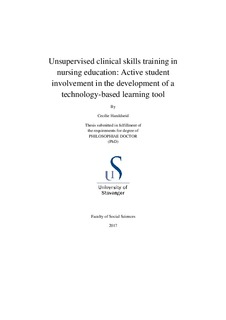Unsupervised clinical skills training in nursing education: Active student involvement in the development of a technology-based learning tool
Doctoral thesis
Permanent lenke
http://hdl.handle.net/11250/2565228Utgivelsesdato
2017Metadata
Vis full innførselSamlinger
- PhD theses (SV-IH) [15]
Originalversjon
Unsupervised clinical skills training in nursing education: Active student involvement in the development of a technology-based learning tool by Cecilie Haraldseid, Stavanger : University of Stavanger, 2017 (PhD thesis UiS, no. 364)Sammendrag
This thesis describes the process of active student involvement in development of a technology-based learning tool for clinical skills training. The thesis also explores how technology-based learning tool can facilitate unsupervised learning and discusses how students can become increasingly self-directed learners.
Acquiring clinical skills is an especially demanding activity for nursing students, where they need to combine components from psychomotor, cognitive, and affective learning domains. Clinical skills are traditionally taught using a combination of real-life rehearsals during practical placements and simulation of different clinical nursing activities in clinical skills laboratories (CSL). Claims of diminished learning opportunities during practical placements has led to a growing emphasis on the importance of clinical skills training at the faculties CSLs. Accordingly, there has been increasing interest in methods that can help students obtain necessary skills in the CSL. In line with general technological advancements in society, these methods have increasingly involved different technological components.
New policy initiatives and growing literature within higher education are calling for students not only to be consulted during the development of learning strategies, but also to become actively involved in creation of their own learning experiences. Consequently, a frequent training method for clinical skills learning within nursing education and for higher education in general is unsupervised training activities where students must initiate their own learning processes.
Based on this, studies of active student involvement in development of a technology-based learning tool for unsupervised clinical skill training would be a valuable contribution to nursing education research. The aim of the thesis has been twofold: (I) To explore the process of active student involvement in the development of a technology-based learning tool, and (II) to explore how this technology-based learning tool can facilitate unsupervised clinical skills learning.
To pursue this aim, this thesis has adopted a qualitative research design with an explorative approach. Since end users and active student involvement is a key element, the thesis follows a participatory design approach entailing four different stages (exploration of work, discovery process, prototyping and investigation of utilization). The exploration of work stage is described in Paper I, where the aim was to explore student perception of current clinical skills training. The findings describe the students’ current perceptions of the physical, organizational and psychosocial learning environment. In summary, students report that they seek, lack and crave more instructions concerning what and how to learn clinical skills procedures. [...]
Beskrivelse
PhD thesis in Health, medicine and welfare
Utgiver
University of Stavanger, NorwaySerie
PhD thesis UiS;;364

